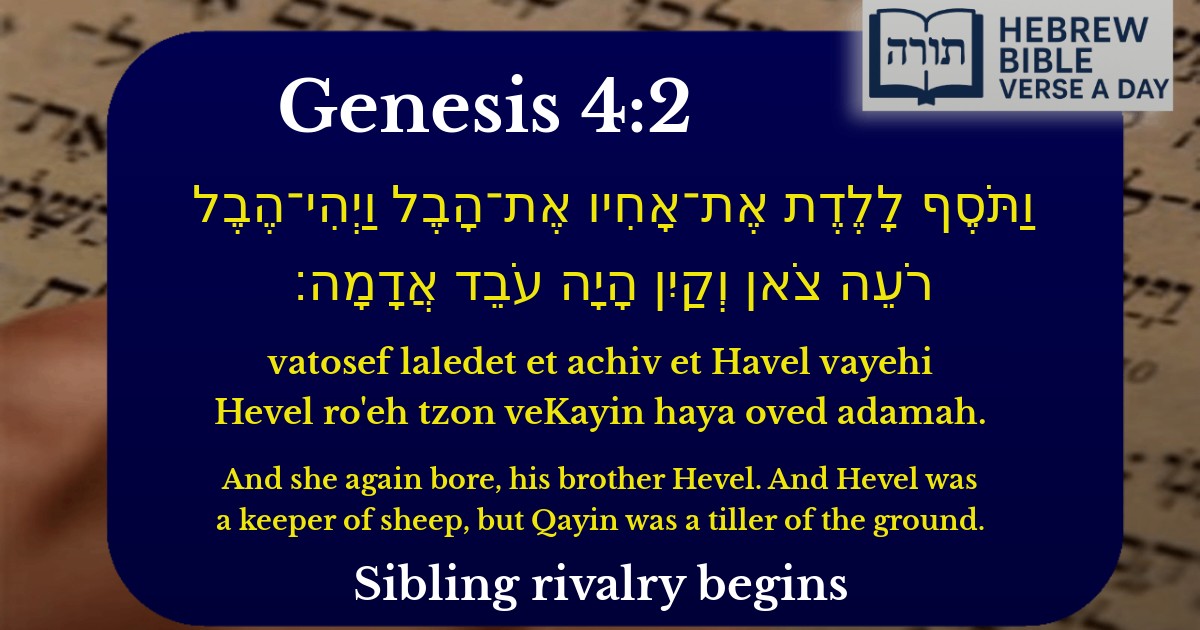Join Our Newsletter To Be Informed When New Videos Are Posted
Join the thousands of fellow Studends who rely on our videos to learn how to read the bible in Hebrew for free!
Hebrew Text
וַתֹּסֶף לָלֶדֶת אֶת־אָחִיו אֶת־הָבֶל וַיְהִי־הֶבֶל רֹעֵה צֹאן וְקַיִן הָיָה עֹבֵד אֲדָמָה׃
English Translation
And she again bore, his brother Hevel. And Hevel was a keeper of sheep, but Qayin was a tiller of the ground.
Transliteration
Vatosef laledet et achiv et Havel vayehi Hevel ro'eh tzon veKayin haya oved adamah.
Hebrew Leining Text
וַתֹּ֣סֶף לָלֶ֔דֶת אֶת־אָחִ֖יו אֶת־הָ֑בֶל וַֽיְהִי־הֶ֙בֶל֙ רֹ֣עֵה צֹ֔אן וְקַ֕יִן הָיָ֖ה עֹבֵ֥ד אֲדָמָֽה׃
וַתֹּ֣סֶף לָלֶ֔דֶת אֶת־אָחִ֖יו אֶת־הָ֑בֶל וַֽיְהִי־הֶ֙בֶל֙ רֹ֣עֵה צֹ֔אן וְקַ֕יִן הָיָ֖ה עֹבֵ֥ד אֲדָמָֽה׃
🎵 Listen to leining
Parasha Commentary
📚 Talmud Citations
This verse is quoted in the Talmud.
📖 Sanhedrin 37b
The verse is referenced in a discussion about the occupations of Cain and Abel, illustrating the different paths they took in life.
📖 Avodah Zarah 22b
Mentioned in a broader discussion about the nature of human labor and divine providence, referencing the different occupations of Cain and Abel.


Introduction to the Verse
The verse describes the birth of Hevel (Abel) and the occupations of Hevel and Qayin (Cain). This narrative appears in Bereishit (Genesis) 4:2 and sets the stage for the subsequent events involving their offerings and Qayin's murder of Hevel.
Occupations of Qayin and Hevel
Rashi (Bereishit 4:2) explains that their occupations reflect their differing natures and roles in the world:
Symbolism in Their Roles
The Kli Yakar (R' Shlomo Ephraim of Luntschitz) highlights a deeper contrast:
Brotherhood and Conflict
The verse emphasizes that Hevel is Qayin's brother, setting up the tragic dynamic between them. The Midrash (Bereishit Rabbah 22:7) teaches that their differing livelihoods contributed to their conflict, as Qayin resented Hevel's spiritual superiority.
Lessons from the Verse
The Malbim (R' Meir Leibush Weiser) explains that this verse foreshadows the moral and spiritual divide between the two brothers: